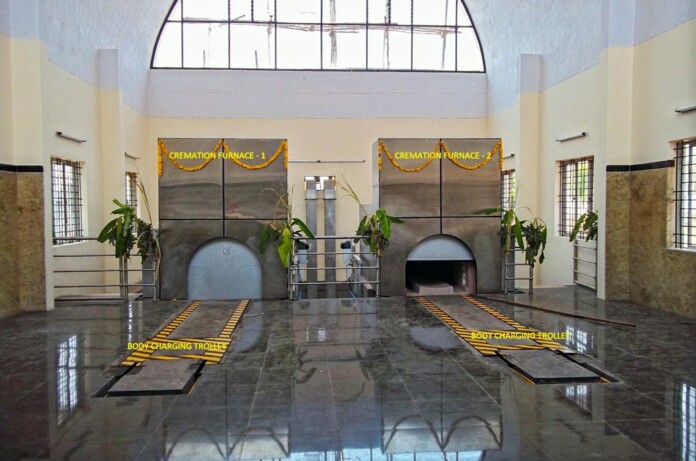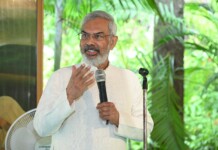The Cremation Landscape in India
In India, where approximately 70-80% of the population practices Hinduism, cremation is the dominant form of death ritual. However, the traditional method of using firewood for cremation is not only expensive but also environmentally unsustainable, contributing to deforestation and air pollution. The cost of cremation using firewood typically ranges between ₹15,000 and ₹25,000, with the cost of firewood being a major component of this expense. In contrast, electric cremation, a more eco-friendly option, costs between ₹5,000 and ₹12,000, according to a report by the Deccan Herald (1).
The COVID-19 pandemic further highlighted the challenges of affordability and infrastructure in cremation practices. Images of dead bodies floating in rivers during the crisis underscored the urgency to develop affordable, accessible, and sustainable death care options, particularly for economically disadvantaged communities.
Entrepreneurs can innovate in this space by creating novel cost-effective solutions.
Startup Idea: Mobile Crematoriums and Digital Pujas
A mobile crematorium could be designed to operate in rural and urban areas alike, preferably powered by renewable energy sources. Mobile crematoriums offer a sustainable and cost-effective solution by reducing dependency on firewood and transportation costs for the consumer. Additionally, the mobile unit could feature a digital puja system, where families can stream rituals and prayers through a dedicated platform, saving time and money on physical priests or elaborate ceremonies while lowering the carbon footprint.
Startups like Aarogya Cremation in India are already exploring solar-powered crematoriums, but there is significant potential to scale and diversify these models. Mobile crematoriums could serve as an alternative or complement other innovative solutions.
Burials: Addressing Land Scarcity and Rising Costs
While cremation is the preferred method for most Hindus, Muslims and Christians in India traditionally opt for burials. However, with the increasing urbanization of India, the availability of burial grounds is becoming scarce, and the cost of land for burial is rising rapidly. In cities, the cost of a grave plot can range from ₹18,000 to ₹1 lakh, depending on the location. Additionally, the cost of wooden coffins for burials can vary from ₹6,000 to ₹50,000, according to an article in the Economic Times (2).
Startup Idea: Biodegradable Coffins and Green Burials
Biodegradable coffins, made from recycled cardboard, bamboo, or other natural materials, offer a more affordable and eco-friendly option. These coffins decompose more quickly than traditional wooden coffins, reducing the environmental impact and promoting sustainability. The cost of biodegradable coffins can range from ₹2,000 to ₹10,000, making them a more accessible option for low-income families.
Startups could also explore green burials, where bodies are buried without embalming chemicals, using natural materials like wool or cotton for shrouds. This method reduces the environmental footprint by allowing the body to decompose naturally and return to the earth. These practices are already gaining traction in Western countries, with companies like Capsula Mundi in Italy offering burial pods that grow into trees. Entrepreneurs in India could adapt such concepts to local conditions by collaborating with farmers, creating a win-win for both families and agricultural communities.
Best Practices: Global Innovations in Burial Practices
Several countries have adopted innovative burial practices that offer inspiration for India:
China: Urban areas promote eco-friendly sea and tree burials, conserving land and encouraging environmental stewardship.
Japan: Tokyo’s vertical cemeteries, integrated with augmented reality, address severe land scarcity while maintaining family connections. These cemeteries stack burial plots in high-rise structures, allowing urban families to “visit” their loved ones virtually, blending tradition with cutting-edge technology.
Indonesia: The Torajan people of Sulawesi use biodegradable burial shrouds in community-led rituals. These shrouds reduce environmental impact while fostering collective responsibility and preserving cultural heritage. This sustainable practice eliminates the need for resource-intensive coffins, making it a cost-effective and eco-friendly solution.
Technological Innovation: Accelerating Decomposition for Land Reuse
Technologies that speed up decomposition offer promising solutions for land reuse. Resomation, or water cremation, uses water, heat, and pressure to break down the body within hours, leaving only small amounts of organic material. Already used in Sweden and the U.S., this method could be adapted for India, reducing the demand for burial grounds and enabling faster land recycling.
A Call to Action for Entrepreneurs
The cremation and burial sectors in India are ripe for innovation, and entrepreneurs have an opportunity to make a significant impact by offering sustainable and cost-effective alternatives. By exploring mobile crematoriums, solar-powered systems, biodegradable coffins, partnerships with farmers, and accelerated decomposition technologies, startups can address the pressing challenges of land scarcity, environmental degradation, and rising costs in the death care industry.
The key to success will be creating solutions that are both environmentally responsible and culturally sensitive. Entrepreneurs must engage with religious and community leaders to ensure their innovations are embraced and respected. Ultimately, the goal is to create a more sustainable and accessible death care system that not only reduces environmental impact but also alleviates the financial burden on families.
References
- Deccan Herald, “Space for burial comes at a price in Hyderabad,” January 2024.
- Economic Times, “Space crunch forces burial grounds to increase rates,” October 2023.
- Better Place Forests, “A New Paradigm in Burial,” 2024.
- Times of India, “China’s Burial Innovations: Lessons for India,” November 2023.
- Zenbird Media, “Japan’s First Circular Burial Service Commences,” 2024.
- True Connection, “Green Burial Practices in Indonesia,” 2024.
Ram Ramprasad has written many articles on sustainable strategies for well-known publications. Ram served as the Global Marketing Director for a leading multinational company in the USA. He holds degrees from Madras University in India and Yale University in the USA.
Ram’s previous articles published in SustainabilityNext
How India’s Agriculture Can Save 200 Billion Cubic Meters of Water
Ten Powerful Reasons for Declaring Moon A Living Entity
Sustainable Wind Turbines: Balancing Bird Protection and Agriculture
A Holistic Water Strategy for India
How India Can Leverage its GST Model for Building a Sustainable Future
A Toolkit for India’s Green Transition
Green Building Strategy – Integrating Innovations from East and West
Eat Less Fish, Save the Planet
Startups are Working Hard for a Plastic-free World
Hydrogen More Harmful Than Fossil Fuels
Tech Startups Can Make India Water Rich
Measure How Basic Elements are Doing, Not Just GDP
A Radical Strategy for A Greener India – The Story of Kusha











